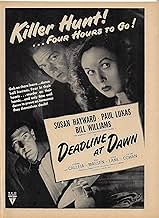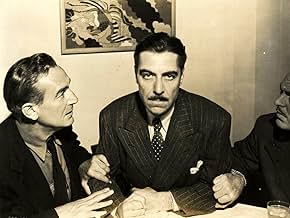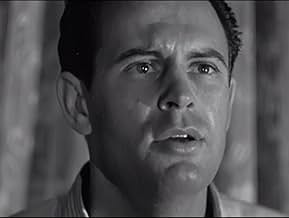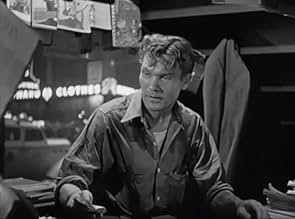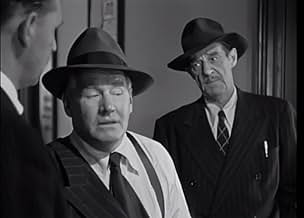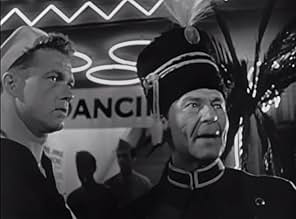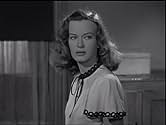IMDb-BEWERTUNG
6,8/10
2460
IHRE BEWERTUNG
Füge eine Handlung in deiner Sprache hinzuAfter a woman he meets is murdered, a soon-to-ship-out sailor has until dawn to find the killer, aided by a weary dance hall girl.After a woman he meets is murdered, a soon-to-ship-out sailor has until dawn to find the killer, aided by a weary dance hall girl.After a woman he meets is murdered, a soon-to-ship-out sailor has until dawn to find the killer, aided by a weary dance hall girl.
- Regie
- Drehbuch
- Hauptbesetzung
- Auszeichnungen
- 1 Nominierung insgesamt
Ernie Adams
- Waiter
- (Nicht genannt)
Fred Aldrich
- Beefy Nightclub Guest
- (Nicht genannt)
Walter Bacon
- Commuter
- (Nicht genannt)
John Barton
- One-Legged Man
- (Nicht genannt)
Billy Bletcher
- Waiter
- (Nicht genannt)
Empfohlene Bewertungen
Deadline at Dawn (1946)
If you can overcome, or overlook, the slightly stilted plot and the improbability of the events (in an O'Henry kind of way, if you know his clever short stories, though the actual writer is Clifford Odets, whose politics are not very visible), you'll be able to catch the really fine acting and directing here. And the nicely felt night crime drama that is really just a beautiful sappy love story (the best kind). The cast is small, the plot twists unreasonable but still enchanting, and the effect, in the end, is tightly wound.
While you might think the murder is the central premise (and it's key, for sure), or the sailor's blackout is the main event (and it isn't, really), you will eventually see it's the sailor himself, his utter innocence, that is both the core of the film and the driving force. This is the Odets part of the writing, character driven, and the sailor, through some effect of drinking we assume, has had a brief blackout, and he comes to his senses on the streets of New York with a lot of cash in his pocket. He's troubled, but we sympathize. Then a woman he was with is found dead. Still, this sailor is such the definition of innocence, there's no doubt--almost no doubt--that someone else did it. But who? And how can he defend himself?
Enter Susan Hayward, playing at first a kind of professional dance companion (the innocent side of prostitution, and a good match for our man). After work, she wants to help him because he's so clearly a good person, and then a cabbie strangely gets involved, too, sucked into the idea that justice will go wrong if the real killer can't be found. The dead woman had a couple of unsavory friends, and these two get into the plot in stages, and what we end up with is half a dozen clearly defined people all fighting for some small piece of personal clarity and internal well being.
It helps that all the actors are first rate small time contributors (Hayward is the one star, and is terrific). It also helps that the whole scenario is limited in time and space, so we get to feel like we are there, in New York, in this small neighborhood at night. It's great stuff on that level alone. The director? It's his one and only film. But the cinematographer was an old pro at the peak of his career, Nicholas Musuraca, who did a whole slew of noirs and dramas, some worth seeing just for the photography ("Spiral Staircase" comes to mind, but see the IMDb list). So whatever the small time credentials of much of the cast, there is some seriousness here that won't let go.
If the plot is a little preposterous, it's only because it's trying to package things too neatly. The writing is first rate, beyond plot structure, with some classic quotable lines that are either film noir staples or philosophical nuggets (the latter from the cabby, in particular). A film that would reward a second viewing just for the details of dialog and camera-work.
If you can overcome, or overlook, the slightly stilted plot and the improbability of the events (in an O'Henry kind of way, if you know his clever short stories, though the actual writer is Clifford Odets, whose politics are not very visible), you'll be able to catch the really fine acting and directing here. And the nicely felt night crime drama that is really just a beautiful sappy love story (the best kind). The cast is small, the plot twists unreasonable but still enchanting, and the effect, in the end, is tightly wound.
While you might think the murder is the central premise (and it's key, for sure), or the sailor's blackout is the main event (and it isn't, really), you will eventually see it's the sailor himself, his utter innocence, that is both the core of the film and the driving force. This is the Odets part of the writing, character driven, and the sailor, through some effect of drinking we assume, has had a brief blackout, and he comes to his senses on the streets of New York with a lot of cash in his pocket. He's troubled, but we sympathize. Then a woman he was with is found dead. Still, this sailor is such the definition of innocence, there's no doubt--almost no doubt--that someone else did it. But who? And how can he defend himself?
Enter Susan Hayward, playing at first a kind of professional dance companion (the innocent side of prostitution, and a good match for our man). After work, she wants to help him because he's so clearly a good person, and then a cabbie strangely gets involved, too, sucked into the idea that justice will go wrong if the real killer can't be found. The dead woman had a couple of unsavory friends, and these two get into the plot in stages, and what we end up with is half a dozen clearly defined people all fighting for some small piece of personal clarity and internal well being.
It helps that all the actors are first rate small time contributors (Hayward is the one star, and is terrific). It also helps that the whole scenario is limited in time and space, so we get to feel like we are there, in New York, in this small neighborhood at night. It's great stuff on that level alone. The director? It's his one and only film. But the cinematographer was an old pro at the peak of his career, Nicholas Musuraca, who did a whole slew of noirs and dramas, some worth seeing just for the photography ("Spiral Staircase" comes to mind, but see the IMDb list). So whatever the small time credentials of much of the cast, there is some seriousness here that won't let go.
If the plot is a little preposterous, it's only because it's trying to package things too neatly. The writing is first rate, beyond plot structure, with some classic quotable lines that are either film noir staples or philosophical nuggets (the latter from the cabby, in particular). A film that would reward a second viewing just for the details of dialog and camera-work.
The real star of this underappreciated noir is Clifford Odets' dialogue, which you either love or you hate. I love it. Really terrific performances, and even the bit players are memorable. Look for Group Theater vet Roman Bohnen in a tiny role as the building janitor with a dead cat-- "she could practically speak." Or Jerome Cowan, a B-movie actor in a zillion Forties flicks, wonderfully slimy as a Broadway producer. Filmed on a backlot, but it seethes New York more than most location movies.
Terrific performances by many actors make this 1946 noir a joy to watch. Nifty murder mystery directed by Harold Clurman and written by Clifford Odets. As mentioned elsewhere on this board the dialog is wondrous; you never know what anyone will say, and everyone seems to "wax philosophic" throughout the film.
The action follows a murder of a woman and how it involves a sailor on leave, a dance-hall girl, and a taxi driver. The story takes place on a sweltering New York night in the early hours. The sailor must catch a 6 AM bus, so there's the "deadline at dawn." As the protagonists track down clues, they run across a bizarre collection of shady types, and everyone seems to to capable of murder, especially of this particular woman.
Susan Hayward gives a stunning performance as June. She starts out as a wisecracking and downhearted taxi dancer who resists getting involved but can't help herself since the sailor (Bill Williams) seems so innocent and naive. She calls him Boob McNutt. As they race around the city tracking down clues (this city never sleeps) they meet a world-weary taxi driver (Paul Lukas) who helps out. All three stars give amazing performances here.
Supporting players are also a knockout with Lola Lane terrific as the victim, Joseph Calleia as her creepy brother, Osa Masson (with a limp), and Marvin Miller, Jerone Cowan, Constance Worth, Al Bridge, Steven Geray, Joseph Crehan and others all solid.
Odets' writing is excellent even if all the characters seem to talk in the same poetic language. But it becomes mesmerizing as the characters seek the truth and talk. It seems that everyone is city wise but a poet at heart.
Hayward looks great with her hair pinned up (it's a sultry night) with bobby pins. She wears little makeup. Williams is also wonderful as the sailor who's not quite as dumb as he seems. Lukas is also solid as the surprising taxi driver.
Great film noir with touches of poetry and humor. What more could you want?
The action follows a murder of a woman and how it involves a sailor on leave, a dance-hall girl, and a taxi driver. The story takes place on a sweltering New York night in the early hours. The sailor must catch a 6 AM bus, so there's the "deadline at dawn." As the protagonists track down clues, they run across a bizarre collection of shady types, and everyone seems to to capable of murder, especially of this particular woman.
Susan Hayward gives a stunning performance as June. She starts out as a wisecracking and downhearted taxi dancer who resists getting involved but can't help herself since the sailor (Bill Williams) seems so innocent and naive. She calls him Boob McNutt. As they race around the city tracking down clues (this city never sleeps) they meet a world-weary taxi driver (Paul Lukas) who helps out. All three stars give amazing performances here.
Supporting players are also a knockout with Lola Lane terrific as the victim, Joseph Calleia as her creepy brother, Osa Masson (with a limp), and Marvin Miller, Jerone Cowan, Constance Worth, Al Bridge, Steven Geray, Joseph Crehan and others all solid.
Odets' writing is excellent even if all the characters seem to talk in the same poetic language. But it becomes mesmerizing as the characters seek the truth and talk. It seems that everyone is city wise but a poet at heart.
Hayward looks great with her hair pinned up (it's a sultry night) with bobby pins. She wears little makeup. Williams is also wonderful as the sailor who's not quite as dumb as he seems. Lukas is also solid as the surprising taxi driver.
Great film noir with touches of poetry and humor. What more could you want?
This is a strange little movie, which I'm sure is primarily due to Clifford Odets bizarre screenplay, but I freely admit that I really enjoyed it! The plot is somewhat convoluted (although not as hard to follow as some make out) and the ending is a little 'feel good' for a noir but Odets' dialog is what will bring you into it - or push you out. I still can't figure if the way his characters speak is closer to real life than 'regular' movie dialog, or nothing at all like anyone speaks; it somehow manages to be a little of both. One thing for sure is this is not how people normally speak in movies. Strong performances by Susan Hayward and Paul Lukas contribute to the fun; and that's what I found it to be. You've got likable characters, clever dialog, a mystery to solve before dawn, and Susan Hayward looking as good as I can remember. What else do you need?
A young sailor on leave wakes up at midnight in a newsstand with bundles of money in his pockets and no recollection of his time spent with the wrong woman. Of course she turns out to be dead and he has until a bus leaves at 6am to discover the culprit or he gets the rap.
I like films with concentrated wandering, this one has it, the entire film like a slow ride across New York after hours in the backseat of a cab with windows rolled down, it's the middle of August, the macadam breathing out the day's heat again, or like lounging by the open window of your apartment with lights turned off, glimpses of strange figures stalking the empty and sweltering streets below and imagining mischief from them.
It has mood above all, latenight paranoia being sweated out from pores in the skin. Everything looks a bit unhinged in that magic-desolate way that is summer in the big city.
But this is deeply noirish in a key way, the way of the dumb guy's dream that crystallizes the essence of noir. Our man was out at night dreaming but has no recollection what about, except it involved offers of sex and illicit money. We presume he's innocent because of his naive blond looks and because he's the one telling the story, and is bewildered as he does, because more likely suspects are paraded, stories are piled, testimonies, conjecture, a drunk man uncovers hidden truth, a cab driver reflects about love, but the puzzle persists, the puzzle that is the night of life; we cannot really know, there is a blank spot at the center. Emptiness behind the stories that we make up to narrate our private worlds.
You will need no more eloquent parallel about what this is all about than a blind pianist among the suspects and being - mistakenly - sussed from his melodramatic reaction.
So we have sinister happenings back in the waking world, itself rendered as something you wake up from. Then our film as a dream attempting inner balance, so of course thick in coincidence, in strange but kind souls assisting, capped off with a miraculous revelation in the end that absolves guilt.
This is truly wonderful stuff that has burned itself into my visual imagination. It's clean and dark both, the shadows all in having traveled, having dreamed the night away.
I like films with concentrated wandering, this one has it, the entire film like a slow ride across New York after hours in the backseat of a cab with windows rolled down, it's the middle of August, the macadam breathing out the day's heat again, or like lounging by the open window of your apartment with lights turned off, glimpses of strange figures stalking the empty and sweltering streets below and imagining mischief from them.
It has mood above all, latenight paranoia being sweated out from pores in the skin. Everything looks a bit unhinged in that magic-desolate way that is summer in the big city.
But this is deeply noirish in a key way, the way of the dumb guy's dream that crystallizes the essence of noir. Our man was out at night dreaming but has no recollection what about, except it involved offers of sex and illicit money. We presume he's innocent because of his naive blond looks and because he's the one telling the story, and is bewildered as he does, because more likely suspects are paraded, stories are piled, testimonies, conjecture, a drunk man uncovers hidden truth, a cab driver reflects about love, but the puzzle persists, the puzzle that is the night of life; we cannot really know, there is a blank spot at the center. Emptiness behind the stories that we make up to narrate our private worlds.
You will need no more eloquent parallel about what this is all about than a blind pianist among the suspects and being - mistakenly - sussed from his melodramatic reaction.
So we have sinister happenings back in the waking world, itself rendered as something you wake up from. Then our film as a dream attempting inner balance, so of course thick in coincidence, in strange but kind souls assisting, capped off with a miraculous revelation in the end that absolves guilt.
This is truly wonderful stuff that has burned itself into my visual imagination. It's clean and dark both, the shadows all in having traveled, having dreamed the night away.
Wusstest du schon
- WissenswertesJoe Sawyer's character of washed-up baseball player Babe Dooley was based on Chicago Cubs hitting great Hack Wilson whose alcoholism led to his steep professional and personal decline.
- PatzerAt the end, the main characters exit the 8th Police Precinct. It is night, and the streets are deserted. Yet when June and Alex drive away in the police car, it can be seen through the back window of the vehicle that the streets are bustling with activity, cars, and people, and it's bright and sunny.
- Zitate
June Goffe: If you hear a peculiar noise, it's my skin creeping.
- VerbindungenFeatured in Noir Alley: Deadline at Dawn (2017)
Top-Auswahl
Melde dich zum Bewerten an und greife auf die Watchlist für personalisierte Empfehlungen zu.
- How long is Deadline at Dawn?Powered by Alexa
Details
- Erscheinungsdatum
- Herkunftsland
- Sprachen
- Auch bekannt als
- Un amanecer trágico
- Drehorte
- Backlot, 20th Century Fox Studios - 10201 Pico Blvd., Century City, Los Angeles, Kalifornien, USA(New York night street scenes)
- Produktionsfirma
- Weitere beteiligte Unternehmen bei IMDbPro anzeigen
- Laufzeit1 Stunde 23 Minuten
- Farbe
- Seitenverhältnis
- 1.37 : 1
Zu dieser Seite beitragen
Bearbeitung vorschlagen oder fehlenden Inhalt hinzufügen

Oberste Lücke
By what name was Deadline at Dawn (1946) officially released in India in English?
Antwort
